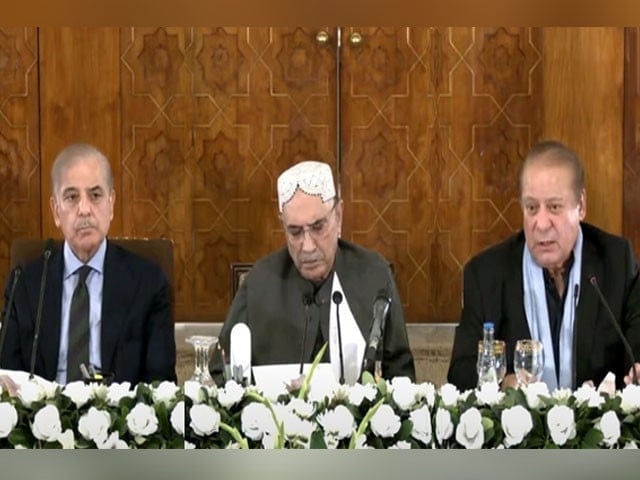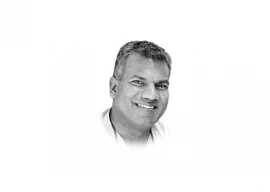
An all-parties conference (APC) focusing on the Palestinian crisis took place at Aiwan-e-Sadar, attended by a multitude of political leaders from various parties.
This significant gathering aims to address the escalating situation in the Middle East and the humanitarian plight of Palestinians in light of the Israeli violence.
Invited by Prime Minister Shahbaz Sharif, the conference has brought together key political figures, including President Asif Ali Zardari, former Prime Minister Nawaz Sharif, Jamiat Ulema-e-Islam (JUI-F) leader Fazlur Rehman, and leaders from the Awami National Party (ANP), Pakistan Peoples Party (PPP), and other prominent parties.
The presence of such a diverse group underscores the urgency and importance of the discussions at hand.
The conference officially began after the national anthem and a recitation of the Holy Quran.
Sherry Rehman, a senior leader, presented the agenda, highlighting October 7 as a day of mourning due to the Israeli attacks on Palestinian civilians.
Following this, President Zardari delivered the inaugural speech, emphasising the dire need for the international community to take a stand against the ongoing violence.
"In the latest wave of Israeli aggression, over 41,000 Palestinians have been martyred," Zardari stated, urging the global community to intervene. He described the current situation as a genocide against Muslims, particularly in Gaza, and called for a collective response from Islamic nations to prevent further atrocities.
Nawaz Sharif condemned the violence against unarmed Palestinians, labelling it a historical atrocity. He painted a stark picture of the devastation, stating, "Entire cities have been reduced to rubble, and families have been torn apart, with children taken from their mothers and killed before their eyes." Nawaz expressed frustration over the inaction of the United Nations, emphasising that its resolutions regarding Palestinian rights remain unimplemented, leaving Palestinians vulnerable and without recourse.
Drawing parallels between the Palestinian issue and the long-standing Kashmir conflict, Nawaz lamented the UN's failure to act decisively in both cases. "What is the point of a UN that cannot enforce its own resolutions? It is a disgrace," he said, calling for a robust strategy that prioritises justice and humanitarian aid for Palestinians.
Nawaz urged Islamic nations to unite and take decisive action, asserting that the time for passive observation has passed. "We must mobilise our resources and create effective policies," he said, stressing that now is the time to act before further bloodshed occurs. He noted, "Israel feels emboldened by the support of global powers, and they must consider how long they can test the patience of the Islamic world."
The conference is set to conclude with a series of resolutions aimed at increasing international pressure on Israel and coordinating a unified response among Islamic nations.
Leaders expressed their determination to continue advocating for the rights of Palestinians and to hold Israel accountable for its actions.
Flouting a UN Security Council resolution calling for an immediate cease-fire, Israel has continued a relentless offensive on Gaza following an attack by Hamas last October.
More than 41,800 victims have been killed, most of them women and children, in the year since, and nearly 97,000 others injured, according to local health authorities.
The Israeli onslaught has displaced almost the entire population of the territory amid an ongoing blockade that has led to severe shortages of food, clean water and medicine.
Israel also faces a genocide case at the International Court of Justice for its actions in Gaza.











1728279962-0/Untitled-design-(7)1728279962-0-270x192.webp)








COMMENTS
Comments are moderated and generally will be posted if they are on-topic and not abusive.
For more information, please see our Comments FAQ